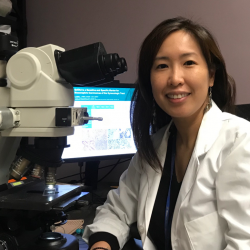Six applicant teams have been recognized for research excellence with GCI’s 2025 Gynecologic Cancer Research Award Competition.
This year, the Carraresi Foundation Research Grants, Sumiko Kobayashi Marks Memorial Research Grants, and Division of Gynecologic Oncology Research Awards were combined into a single competition. Supported by the VGH & UBC Hospital Foundation and the UBC Division of Gynecologic Oncology, these one-year grants of $20,000 are designed to support early to mid-career researchers, provide rapid turn-around constructive feedback, and fund proposals that may not be eligible for national-level support. Projects were selected for their potential to advance gynecologic cancer research through innovative, feasible, and impactful work, contributing either immediate advancements or preliminary data to support subsequent, externally funded research.
We are delighted to congratulate the recipients of the 2025 Gynecologic Cancer Research Awards:
Clarifying the Morphologic Boundaries and Clinical Behavior of HPV-independent TP53 wild-type Vulvar Intraepithelial Neoplasia, with Insights into Biologic Progression



The Sumiko Kobayashi Marks Memorial Award has been awarded to Dr. Lien Hoang for the application, “Clarifying the Morphologic Boundaries and Clinical Behavior of HPV-independent TP53 wild-type Vulvar Intraepithelial Neoplasia, with Insights into Biologic Progression.” Trainee Applicants: Drs. Jennifer Ji and Allen Zhang.
With the support of this award, Dr. Hoang’s team will investigate precursor lesions of vulvar squamous cell carcinoma. Squamous cell carcinoma is the most common cancer of the vulva. Due to its aggressive behavior and location, this cancer has significant mortality and morbidity. Squamous cell carcinomas arise from precursor lesions – vulvar intraepithelial neoplasia (VIN). Precursor VIN lesions can be surgically removed before invasion to prevent the development of squamous cell carcinoma. Accurate diagnosis of VIN is imperative in further management plans. Two types of pathways exist for the development of squamous cell carcinomas – one that is caused by prolonged HPV infection, another is independent of HPV infection and can harbor a TP53 mutation. While there are reliable biomarkers to identify the HPV- associated lesions and the HPV-independent, TP53 mutated precursor lesions (p53 abnormal VIN), the diagnosis of HPV-independent VINs without a TP53 mutation (p53 wild type VIN) remains a challenge. In addition, the clinical course of these p53 wild type precursor lesions have not been elucidated, making clinical management challenging. In this study, they will collect cases of first-time diagnosis of HPV-independent VIN over a 5-year period to determine the malignant transformation rate of p53 wildtype and p53 abnormal VIN cases. For the p53 wildtype cases that progressed to squamous cell carcinoma, they will use a spatial RNA expression analysis to study the RNA expression of the precursor lesion and adjacent carcinoma. Insights will help to advance our understanding of the biological process of oncogenesis and help identify clinically applicable biomarkers
DNA Methylation Signatures in Self-Collected Samples for Early Detection of Endometrial Cancer: A Multi-Omics Approach



The Division of Gynecologic Oncology Award has been awarded to Dr. Aline Talhouk for the application, “DNA Methylation Signatures in Self-Collected Samples for Early Detection of Endometrial Cancer: A Multi-Omics Approach.” Trainee Applicant: Dr. Karolin Heinze. Co-applicant: Dr. Michael Anglesio.
With the support of this award, Dr. Talhouk’s team will explore a less invasive approach to early uterine cancer detection. Uterine cancer is the most common gynecologic cancer in North America, and its rates are rising. A key early warning sign is abnormal bleeding, especially in individuals in menopause. To rule out cancer, many undergo a painful and invasive biopsy, though most of these return normal results. This means many people are enduring unnecessary procedures. Recent studies suggest it is possible to detect early signs of uterine cancer in DNA obtained from self- collected materials (like tampons and at-home vaginal swabs). Some research has focused on genetic alterations, which are also seen in healthy aging people and do not always indicate cancer. Other studies have looked at bacteria that live in the vagina as an early indicator for cancer. These bacteria also change with aging. This project will test whether the detection of chemical modification of the DNA, called epigenetic changes, can serve as more accurate indicators of early cancer. These changes affect how genes function and often appear before genetic alterations. By analyzing DNA from at-home patient collected samples, they aim to identify altered epigenetic signals linked to cancer and combine them with genetic information and data on the bacteria that are concurrently detected. This approach is less invasive, more accessible, and may help close gaps in care experienced by underserved communities. If successful, it could lay the groundwork for a new kind of screening test that is more accurate, less painful, and easier for patients to access.
Understanding ‘HPV-negative’ cervical pre-cancers to improve screening and early detection








The Division of Gynecologic Oncology Award has been awarded to Dr. Andrea Neilson for the application, “Understanding ‘HPV-negative’ cervical pre-cancers to improve screening and early detection.” Trainee Applicant: Dr. Michelle Ng. Co-applicants: Drs. Lily Proctor, Jennifer Pors, Gina Ogilvie, Marco Marra, David Huntsman and Ms. Laurie Smith.
With this award, Dr. Neilson’s team will investigate false-negative HPV test results. Approximately 99% of cervical cancers are caused by human papillomavirus (HPV) infections. HPV is widespread, and most individuals are exposed within a few months to years of becoming sexually active. While most HPV infections are transient and without lasting effects, persistent and productive infections can progress to pre-cancer and eventually cancer. Cervical cancer is a major threat to women’s health globally, but is preventable with vaccination against high-risk HPVs, and early detection and treatment of pre-cancers. HPV testing shows increased sensitivity and predictive value for the detection of HPV associated cervical pre-cancer over conventional cytology-based (Pap smear) methods, but some patients test negative for HPV despite the presence of an HPV associated lesion. Such cases represent a failure of the test to detect when the virus is present (false negative result). In January 2024, British Columbia began transitioning from cytology to HPV based screening for cervical cancer. HPV testing is being implemented by age groups and will be complete in January 2027. This presents a once-in-a-lifetime opportunity where we will have access to cervical cancer screening information that includes both cytology and HPV testing. In this project, the team aims to select cervical precancers identified by cytology that are ‘HPV negative’ and, using genetic analysis, gain insights as to why HPV was not detected or missed. This work will allow us to begin to devise ways to improve how well HPV based cervical cancer screening works.
Evaluating the Potential of CX5461 to Break Immune Silence in BRCA1-Mutated Ovarian Cancer: Studies to assess efficacy and skin toxicity



The Carraresi Foundation Research Grant has been awarded to Dr. Marcel Bally for the application, “Evaluating the Potential of CX5461 to Break Immune Silence in BRCA1-Mutated Ovarian Cancer: Studies to assess efficacy and skin toxicity.” Trainee Applicant: Dr. Maryam Sharifiaghdam. Co-applicant: Dr. Anna Tinker.
With the support of this award, Dr. Bally’s team will investigate a novel treatment for BRCA1-mutated ovarian cancer. Ovarian cancer remains one of the most difficult gynecologic cancers to treat, particularly when it becomes resistant to standard therapies. A major challenge is that some ovarian cancers, especially those cancers BRCA deficiencies, evade immune detection and do not respond to conventional treatments. Our research focuses on a new approach to re-activate the immune system against these tumors using a novel combination of two experimental therapies. One treatment is a nanomedicine formulation of Zn-CX5461. CX5461 is a promising anti-cancer drug that targets the cancer’s internal machinery for making proteins. However, CX5461 has proven to be quite toxic to the skin. Our Zn-CX5461 formulation is designed, in part, to prevent skin toxicity. The second agent is a genetic drug- self amplifying RNA that is formulated in lipid-based nanoparticles designed for efficient delivery of the RNA to liver cells. The liver cells then become the “factory” to produce IL-12, a powerful immune-boosting molecule. The studies proposed will assess whether the drugs alone and in combination generate long-term survival in a mouse model of ovarian cancer. In addition, studies will be completed to demonstrate that the Zn-CX5461 prevents skin toxicity. The results will provide essential data to develop this therapeutic approach and could lay the foundation for a future clinical trial with women with advanced ovarian cancer.
GRACE: Gynecologic Risk Assessment for Cancer Risk Evaluation – Self-collect vaginal swab as a novel testing strategy for BRCA germline carrier identification: a validation study









*Missing Janine Senz
The Carraresi Foundation Research Grant has been awarded to Dr. Lesa Dawson (Principal Applicant) and Dr. Gillian Hanley (co-Principal Applicant) for the application, “GRACE: Gynecologic Risk Assessment for Cancer Risk Evaluation – Self-collect vaginal swab as a novel testing strategy for BRCA germline carrier identification: a validation study.” Trainee Applicant: Dr. Jordan Lewis. Co-applicants: Drs. Aline Talhouk, Lily Proctor, Andrea Neilson, Frederica di Palma, and Ms. Janine Senz, Ms. Julianne McLeod and Ms. Jessica Kwon.
With the support of this award, they will investigate a novel approach to BRCA genetic testing. People with hereditary gene mutations, like BRCA, have a significantly increased lifetime risk of breast and ovarian cancer, with estimates reaching 75% and 44%, respectively. When these mutations are identified through genetic testing, individuals can access lifesaving screening and preventative care. However, current eligibility for this testing is limited to those with a personal or strong family history of cancer. A new approach, known as Population-Based Testing (PBT), challenges this by offering genetic testing to all individuals, regardless of personal or family history. Canada’s current federally funded genetic testing model uses exclusive criteria, resulting in estimates of missing more than 95% of all carriers in a population. To overcome these challenges and realize the potential of PBT, Dr. Dawson’s team will investigate if a self-collected vaginal swab is a valid method for the detection of germline BRCA mutations. This approach is already familiar to many through 2023 launch of British Columbia’s cervical cancer screening program which uses at-home self-collection kits to detect HPV, offering promise as a scalable method for a PBT model. The study will address two main questions: (1) Can vaginal self-collected swabs yield sufficient DNA for germline BRCA testing? (2) Are vaginal self-collected swabs a valid method to identify people with and without BRCA mutations? If successful, this research could lay the foundation for a broader, population-wide approach to genetic testing and the potential integration of a unified program for assessing women’s cancer risk across British Columbia.
Examination of ethnicity and ancestry within endometrial cancer molecular subtypes





The Carraresi Foundation Research Grant has been awarded to Dr. Dawn Cochrane for the application, “Examination of ethnicity and ancestry within endometrial cancer molecular subtypes.” Trainee Applicant: Dr. Allen Zhang. Co-applicants: Drs. David Huntsman, Amy Jamieson, and Jessica McAlpine
With the support of this award, they will investigate molecular subtypes of endometrial cancer across various ethnicities and ancestries. Endometrial cancer is the most common gynecologic cancer in North America, with increasing global incidence and mortality. Molecular features, or the presence or absence of specific proteins or mutations, are now commonly used to classify ECs into groups with different risks of disease recurrence and death. Clinically, these molecular features are used to guide treatment decisions, so that patients are neither over-treated or under- treated. There is increasing evidence that tumors in patients from different ethnic backgrounds have biological differences that can affect clinical outcomes and response to treatment. For example, in non-Hispanic Blacks, tumors are more likely to fall into the most aggressive category of tumors and clinical outcomes are worse for Black patients. Similarly, very limited studies have shown that Asian patients with endometrial cancer have poorer outcomes than White patients. Dr. Cochrane’s team will determine whether different molecular types of endometrial cancers are more prevalent in the most common ethnic minorities in British Columbia (East Asian, South Asian and Southeast Asian). They will also analyze genetic ancestry to get a more refined look at specific populations. These studies provide the framework and preliminary data needed to apply for larger grants to perform in depth characterization on tumors from ethnic minorities in order to understand biological differences compared to tumors from White patients. These studies will allow us to better treat the diverse endometrial cancer patients in British Columbia.
